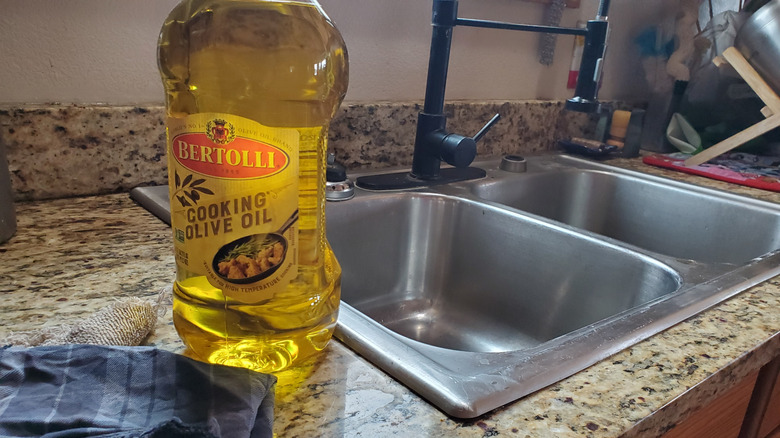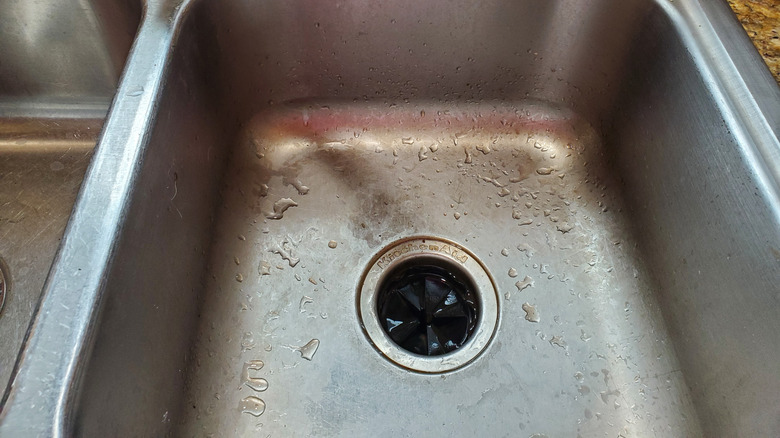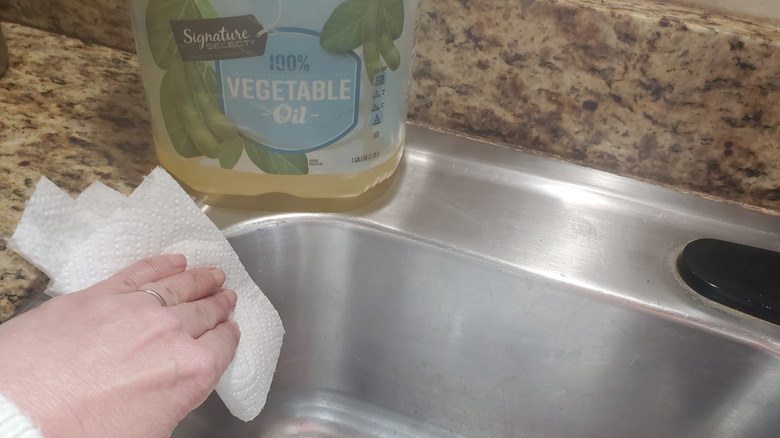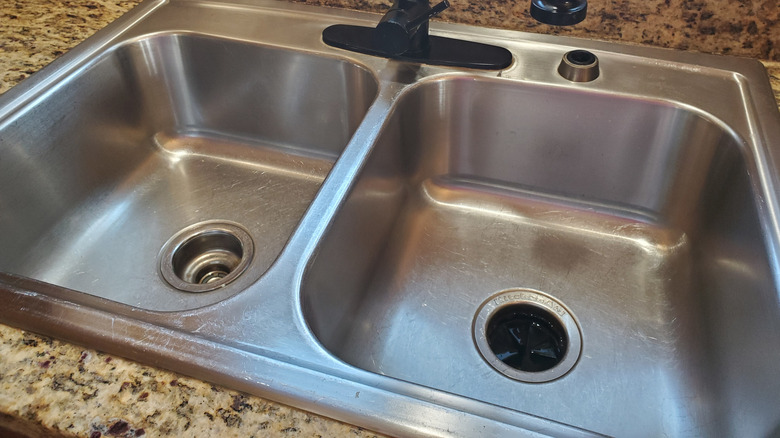Should You Polish Your Kitchen Sink With Olive Oil? Let Us Shine Light On This Costly Hack
We may receive a commission on purchases made from links.
Giving my grimy kitchen sink a thorough cleaning is satisfying. True to my thrifty Scots roots, I make my own scrub from baking soda, salt, and either borax or washing soda. Using baking soda for a cleaner kitchen is smart for the planet and my wallet. It's really effective as part of an eco-friendly scrub, but it usually leaves behind pasty streaks that take a few days to wear off, even after an extra wipe-down. When I learned that olive oil can bring many kinds of sinks to a glistening, toxin-free shine, I thought it was worth trying on our double stainless steel kitchen sink.
People claim that, along with cleaning and polishing your sink beautifully, olive oil will also repel grime and keep it clean for longer. Although I was skeptical, the internet gave me visual proof of streakless sinks after being rubbed with olive oil. I figured I could relinquish a bit of our pantry stash to try it on my own truly filthy sink.
For reference, we use our sink several times a day for washing vegetables and dishes, and we prepare nearly all of our meals at home and from scratch. Plus, our well water is mineral-rich and definitely contributes to gross buildup. One proponent of olive oil sink cleaning stated that since the water beads up on the oiled surface, mineral stains don't show as quickly. That concept alone could convince me to add a dash of olive oil to my cleaning regimen, but I needed to try it for myself first.
Dipping into cleaning with olive oil
The oil I used, Bertolli Cooking Olive Oil, costs around $0.40 per ounce. I certainly wasn't going to sacrifice our pricey extra virgin olive oil for this experiment. I dipped a scrap of terry cloth towel into the oil and gave our dirty sink a thorough scouring. Lo and behold, my stainless steel was shining with nary a streak in sight. But is it worthwhile to incorporate olive oil into my regular cleaning routine? My skepticism remained.
With the cost of olive oil being what it is, I didn't see obvious benefits of using it in place of my tried-and-true scrub mix. I used 2 ounces of less-expensive cooking olive oil to clean both sides of my kitchen sink as well as the surround and the faucet. Ringing up at $0.80 worth of oil, I didn't have to crunch any numbers to know that there's no way 2 ounces of my powder would have this high of a price tag.
With my pocketbook on my mind, I recalled that in addition to a spot-free surface, cleaning with olive oil also supposedly will keep my sink clean for longer. I planned on monitoring my sink over the next few days to see if it seemed cleaner than it normally would with a decent amount of use.
Giving olive oil the test of time
The time came for my first sinkful of soapy dishes. I followed the steps of properly hand washing dishes, and as the last dregs of dishwater drained away, I noticed the telltale "ring around the sink" that appears after every wash up. Thinking there's really no benefit to a well oiled sink, I was tempted to throw in the towel right then. However, I did commit to a few days of use before coming to a conclusion, even if I was doubtful of its efficacy. The sink would have to be subjected to a bit more food prep time and a seriously food-caked dish washing session.
After three days of food prep, washing up, and a particularly messy kitchen project, I have to admit that my sink was still shiny and pleasant to look at. As for whether the oil coating helped repel grime, I was less convinced. On the side of the sink that holds soapy water and dirty dishes, I still saw the usual residue ring around the sink. On the disposal side where we do most of our rinsing and hand washing, the shine was significantly dimmer, and the surface showed grime similar to the amount we'd normally see.
A commenter on one video claimed that any cooking oil can work for this trick, so I gave my sink a spruce up with Safeway Signature Select Vegetable Oil. Bought in bulk, vegetable oil is really affordable and fits well into my frugal lifestyle. I rubbed it on, and the shine was as impressive as what I saw after the olive oil treatment.
Final thoughts on this cleaning hack
I love the way my homemade scrub powers through accumulated grossness in our kitchen sink, and I like how cheap it is to make even more. Using ¼ cup of olive oil to clean my sink every time feels wasteful to me, given that the results weren't drastically better than when I use my usual product. However, the polished surface of our stainless steel sink certainly was enjoyable to look at. I also came across TikToks of people using small dabs of oil on a rag to buff sinks to a shine but not as a cleanser alone. For simply aesthetic purposes, I may opt to do this after cleaning my sink with my preferred scrub.
I've seen cases of people using generous amounts of extra virgin olive oil to do this. I compared the prices of extra virgin with cooking olive oil, and the average price for extra virgin is typically more than cooking olive oil. Since a commenter on one video claimed that any cooking oil can work for this trick, I may stick with simple vegetable oil the next time I clean my sink. All in all, while the oil did indeed shine up my sink, I'm not sure the cost is worth it, since it doesn't seem to provide much more than a pretty finish. While there are some surprising uses for olive oil in your home, I don't see much benefit of using olive oil to clean your kitchen sink, especially with the higher price.



